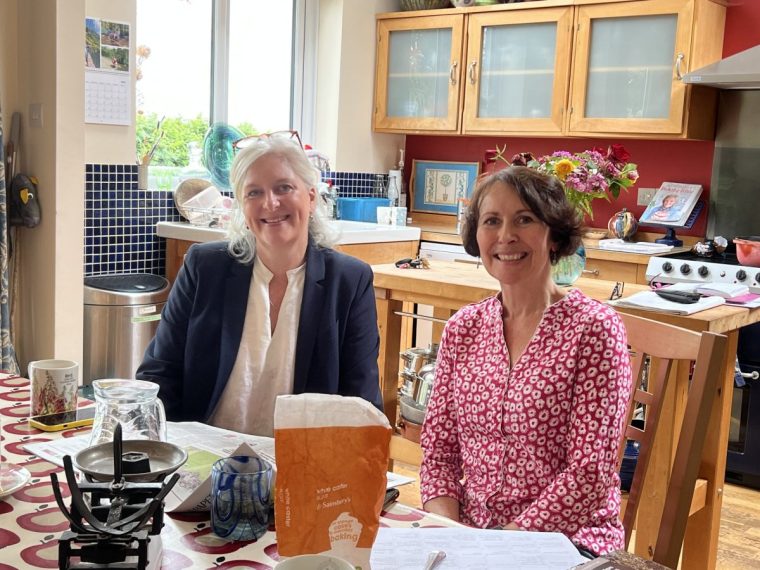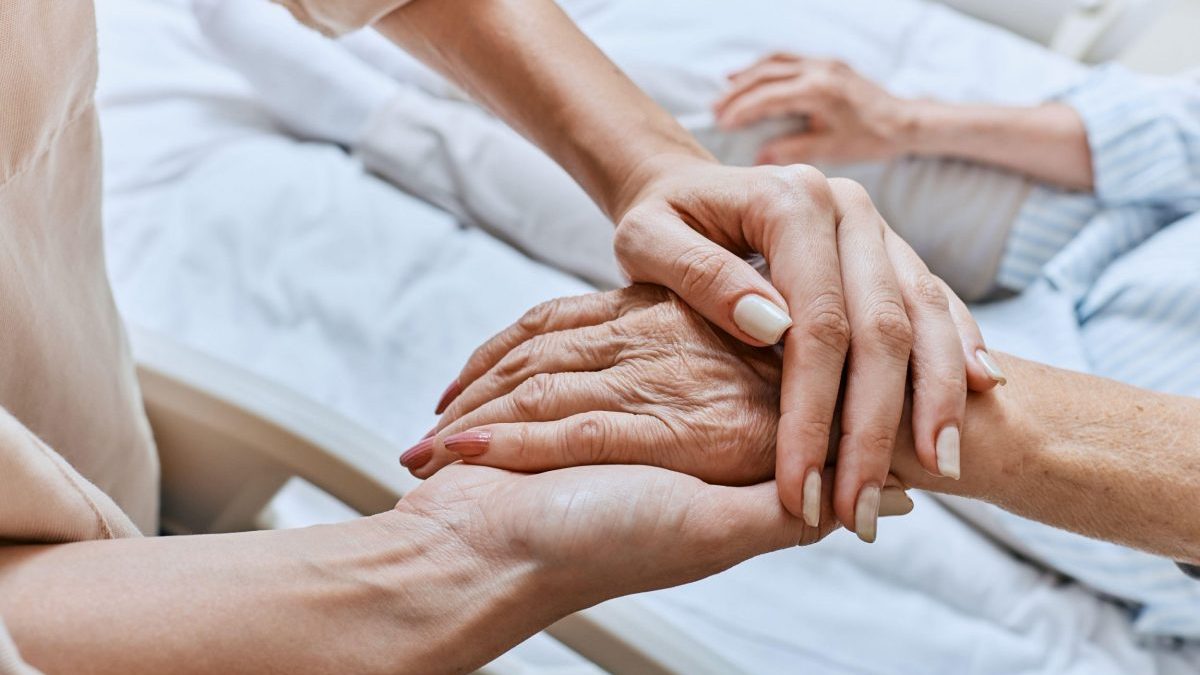MPs across political divide told stories of constituents struggling to access the right help, and the terrible impact of the condition on families
Dementia care is at a crossroads with a postcode lottery in diagnosis rates, a lack of support or respite care for unpaid carers and more funding needed for care homes of high-need patients, the House of Commons heard this week.
MPs across the political divide queued up to tell heartbreaking stories of constituents struggling to access the right help and advice, and the terrible impact it has on so many families, many of whom almost buckle under the strain of watching a loved one succumb to the cruellest of diseases.
“We don’t talk enough about dementia in the chamber,” Caroline Voaden, the Lib Dem MP for South Devon who led the recent debate, told The i Paper.
“We’ve spoken about cancer five times more than dementia since the election. We talk a lot about social care and carers, but it’s really important to talk speficially about dementia. People are carers for a myriad of reasons but dementia is particularly difficult.”
 Caroline Voaden, left, on a recent visit to a dementia support group in South Devon run by The Filo Project, an award winning not-for-profit organisation which provides small group care days for people with early to moderate dementia. (Photo: The Filo Project)
Caroline Voaden, left, on a recent visit to a dementia support group in South Devon run by The Filo Project, an award winning not-for-profit organisation which provides small group care days for people with early to moderate dementia. (Photo: The Filo Project)
Voaden has seen the trauma of dementia firsthand, citing her “brilliant, funny cousin, always the life and soul of family parties who was diagnosed far too early with frontotemporal dementia”, and her “confident, witty, generous father-in-law” who is now “almost unrecognisable as the man he used to be”.
Her elderly mother-in-law eventually had to make the “really difficult decision” to put her husband into a care home – and only that was thanks to the help of a group of local dementia carers who met up every week.
“That was transformational in how she felt supported and had people she felt she could talk to, but not everyone has that. It just made me aware how much of a postcode lottery everything is,” Voaden says.
Postcode lottery for diagnosis rates
Diagnosis rates vary wildly across the country: from 32.2 per cent in the City of London and 44.3 per cent on the Isles of Scilly, to Lincoln, which has the highest diagnosis rate at 93.9 per cent, according to the latest data. South Hams, much of which lies in Voaden’s constituency of South Devon, has the third lowest rate nationally, at just 45.2 per cent.
“While dementia’s scale is national, its impact is deeply local and personal, especially for the thousands of unpaid carers who, because of a postcode lottery, are often left to fend for themselves without the support they need,” Voaden says.
“Nowhere is the inadequacy of our current services more evident than in diagnosis. Early diagnosis is not just about putting a name to a condition. It’s the essential first step toward accessing care, future planning, and receiving treatment. Yet in South Hams the diagnosis rate is just 45 per cent, the lowest in the country.
“In fact, Devon, as a whole, is falling worryingly behind, especially after the Alzheimer’s Society Devon and Torbay Dementia Adviser service ceased at the end of 2023. At the same time, demand for services is increasing sharply, with referrals to the Devon Memory Service surging by 94 per cent over the past five years.”
In 2015, then-Prime Minister David Cameron’s challenge on dementia 2020 set national goals for diagnosis rates, care quality and research impact, including a national target for dementia diagnosis rates of 66.7 per cent.
The NHS long-term plan of 2019 committed to enhancing diagnosis. The same year witnessed the dementia moonshot pledge from Boris Johnson, with an extra £160m. This was followed up in 2022 with the Dame Barbara Windsor dementia mission – a £95m fund to accelerate research into treatment and early diagnosis.
No dedicated dementia strategy
So many MPs spoke in Tuesday’s debate that the Deputy Speaker had to start reducing the amount of time each was allowed to talk for to fit everyone in.
Dr Luke Evans, Tory MP for Hinckley and Bosworth, questioned whether dementia is a priority for the Labour Government and asked whether a dedicated dementia strategy is needed, given all the concerns raised. His colleague, Isle of Wight East MP Joe Robertson, said the decision by the Government and NHS England to remove diagnosis targets from their planning guidance was “a cruel blow to people living with dementia and their families”.
Care minister Stephen Kinnock told the Commons the Government is “absolutely on the record” with the 66.7 per cent target. The latest data from April shows that the diagnosis rate has improved slightly to 65.5 per cent, up 0.3 per cent since July 2024. “It is worth noting that the 66.7 per cent ambition has not been met since 2020,” Kinnock said.
There are currently estimated to be 982,000 people living with dementia in the UK and this is projected to rise to 1.4 million in 2040. The economic cost of dementia to the UK is enormous: including healthcare, social care and the wider costs to society, it is estimated to be over £42bn a year – and £26bn of that is borne by informal carers. Charities say the scale and the need to prevent, diagnose, support, live and die well with dementia will only become greater.
Kieran Winterburn, the Alzheimer’s Society’s head of national influencing, said: “Dementia is the biggest health and social care challenge of our time, but the current social care system is not set up to meet the needs of almost one million people living with dementia in the UK.
“We want to see action via the upcoming Spending Review on our calls for mandatory dementia training for the social care workforce, which currently only 29 per cent of the workforce has received. We also need to see dementia diagnosis prioritised, with new diagnosis rate targets set for the future. Right now, more than a third of people living with dementia in England do not have a diagnosis, putting them at greater risk of crisis without access to care, support and treatment.
“There are a range of inequalities contributing to the disparities in dementia diagnosis rates across the UK, which is why we must see long-term investment in the tools and workforce needed to get everyone the early and accurate diagnosis they deserve.”
Calls for a dementia adviser in every GP surgery
Voaden also wants to see a dementia adviser or health professional embedded within every GP practice in the country, on hand to offer all the advice patients and their families need from the moment they are suspected of having memory loss – one of the main symptoms of dementia.
“That could be advice on getting a formal diagnosis, being signposted to support groups, memory cafes, things like that. It needs to be more joined-up. Early diagnosis is key though.”
Kinnock admitted to MPs that the quality and availability of care services is variable, as they pointed out during the debate. He said the Government is “empowering local leaders with the autonomy they need” to improve services.
“All those who have dementia deserve to receive high-quality care. We must have a workforce that is equipped with the skills that are needed,” Kinnock said.
“On the question of care workforce… To support them, on 7 April the Government increased the carer’s allowance weekly earnings limit from £151 a week to £196 a week, which is the equivalent of 16 hours at the national living wage – the largest increase in the earnings limit since the carer’s allowance was introduced in 1976. We are very proud of that change.”
Paying tribute to the Alzheimer’s Society, Dementia UK and Alzheimer’s Research UK for all their vital work, Kinnock said: “Together, we will build a society where every person with dementia receives high-quality care from diagnosis through to the end of life.”
Dementia drugs pipeline
A report published this week revealed there are more than 100 different drugs in clinical trials for treating or preventing Alzheimer’s disease, the most common form of dementia. However, even if they are eventually approved for use in the UK, the NHS is not prepared for their delivery due to the fact so many cases are diagnosed at a later stage.
That is the case for the two new antibody treatments which have recently been approved – lecanemab and donanemab – and are designed to rid the brain of a protein called amyloid, thought for a long time to be the root cause of the disease. Although both have been given a licence in the UK, they have not been approved for use in the NHS because while they slightly slowed progression of memory loss in trials, the difference was too small to be noticeable by patients or their families. They also caused dangerous side effects such as strokes and brain swelling.
“The truth is that the NHS cannot cope with the innovation we all want in dementia,” Freddie van Mierlo, Lib Dem MP for Henley and Thame, said during the debate. “My message to the Government is simple: get ready.”
Some changes can be made sooner rather than later, Voaden argues. In 2003, her first husband Nick Doughty, a former diplomatic correspondent, died of cancer aged 42 just a year after being diagnosed.
“As his diagnosis was terminal the couple were immediately introduced to a Macmillan nurse,” she says. “That nurse was by our side all the way through. If we needed help with something she was there – and that’s what we need with dementia, so people feel they are not alone. Currently, we are just relying on unpaid carers, family members, saving us billions and looking after everyone. They need our support.”
Growing challenge
For now, dementia remains already the leading cause of death in the UK and as our population ages, the challenge will only grow. The public grows increasingly frustrated as national and local authorities continue to pass the buck and governments dither. The cost of inaction is too high.
“It is really scary and distressing watching what happens to someone you love… probably more so than other conditions,” Voaden says.
“You’re grieving twice. You lose the person you knew and loved, but they’re still alive. My mother-in-law says she knows her husband isn’t coming home and there’s a wardrobe full of clothes he’ll never put on again, but it feels wrong to get rid of them because he is still alive. It’s kind of like living with a ghost. It’s really tough.”
